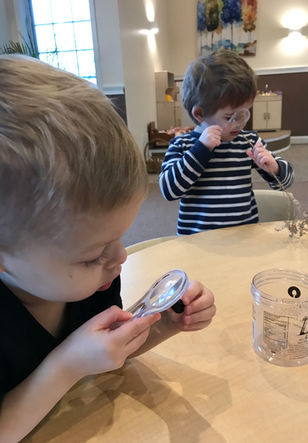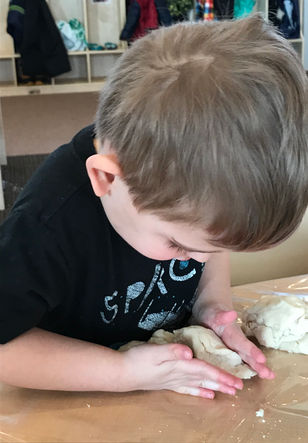
5532 Hanrehan Lake Blvd., Savage, MN 55378
Monday - Friday 6:30 am - 6:00 pm
Philosophy
At Wildflower, our primary goal is to create a nurturing, caring, and exciting learning environment that fosters the emotional, social, cognitive, creative, and physical development of all children. We believe that learning is best supported and promoted through children’s opportunities to explore interesting and developmentally appropriate materials that enhance their inherent sense of wonder and curiosity. Through this natural and unhurried exploration, we know children will continue to ask bigger questions that require deeper reflection and social collaboration to further the investigation.
Caring and trusted adults play a vital role in your child’s development. By getting to know your child and their unique interests and needs, our teachers individualize their strategies and plans for creating a space that both reflects the families and cultures that make-up the collective Wildflower community, as well as meet the needs of each individual within it. Through those relationships, as well as from careful observations about what the children are doing each day, our teachers create thoughtful and stimulating environments that not only challenge and support your children’s higher-level thinking skills but also foster rich opportunities for them to work and play with their peers.
Decades of research in the fields of early learning, child development, and neuroscience strongly suggests that children learn best when they are playfully engaged in activities they find interesting and meaningful. We believe a play-based learning environment is the best way to nurture curiosity, discovery, and inspire a love of life-long learning.
Learn more about our program below.
NATURE-BASED LEARNING
“A child, more than anyone else, is a spontaneous observer of nature…When children come into contact with nature, they reveal their strength.”
– Maria Montessori
Research has shown that all humans benefit from connecting with nature. Infinite opportunities for learning and discovery await in nature for anyone willing to take the time to explore. Children are often our best teachers to show us how to do just that! They need no prompting to engage in rich and wonder-filled explorations when given the time and trust from adults.
As we spend time in our nature play yard, life-cycles, seasonal changes, finding and identifying local plants and animals are just a few of the natural wonders we will encounter every day. Through our thoughtfully planned, nature-based curriculum and our child-directed investigations, academic concepts such as math and literacy are supported through interesting, meaningful activities. Learning comes to life when children are engaged in playful, rich learning experiences. And just remember what developmentalist Bev Bos said, “Remember how good mud feels between the toes?”
Wildflower Early Learning Center has earned national recognition as a certified Nature Explore Classroom from Nature Explore, a division of non-profit Dimensions Educational Research Foundation. Learn More.
PLAY-BASED DEVELOPMENT
“When we treat children’s play as seriously as it deserves, we are helping them feel the joy that’s to be found in the creative spirit. It’s the things we play with and the people who help us play that make a great difference in our lives.” – Fred Rogers
We hope that everyone can agree that play is fun. “Fun” is an important ingredient for a healthy, happy life, for all ages. In early childhood, play that is engaging and fun is also a key element in how fundamental learning occurs. It is through play that children discover new information, acquire new knowledge and show us their understanding of the world. Through play, academic concepts are frequently promoted and reinforced as children regularly apply their knowledge of shape, color, number, letters, etc. in order for their games and play to continue. Also, emotional and social development is promoted and supported through play. Children frequently create stories and act these out with their peers. This type of play helps them to develop language, as well as a sense of self and establishes social connections with those around them. At Wildflower, we believe that children will experience the joy and excitement of learning and the emotional well-being that accompanies forming friendships as they participate in our positive, play-based curriculum.
EMERGENT CURRICULUM
“Too often we give children answers to remember rather than problems to solve.”
– Roger Lewin
We know children are naturally curious and seem to have an insatiable sense of wonder – sometimes it seems like they want to know everything about everything! Think back to how much fun it was to learn something new that you were really interested in – how much were you willing to learn, question, test, and reflect upon when you found a new topic you were excited about?
Emergent curriculum supports that kind of self/child-guided learning. Here at Wildflower, both teachers and children figure out what curriculum topics will be studied in our classrooms. By following the interests and discoveries of the children, their learning potential is increased because of their investment and interest in the curriculum topics. Of course, the teachers know that there is a very big and interesting world out there, yet to be discovered by children, so we thoughtfully prepare provocations to peak the children’s interest and curiosity. We aim to balance our curriculum planning between topics that we know children will be intrigued by, but have not yet been exposed to, and the topics that they have discovered themselves and are curious about.

"We are so thrilled we found Wildflower. It has been the perfect preschool education for our son with its learn through play and nature approach. This unique style of learning is wonderful for our community and children! We highly recommend this curriculum to all who may be considering a special preschool learning and care fostering learn through PLAY!"
- JENNY
Wildflower ELC Parent








